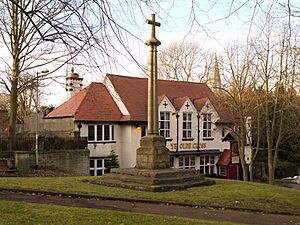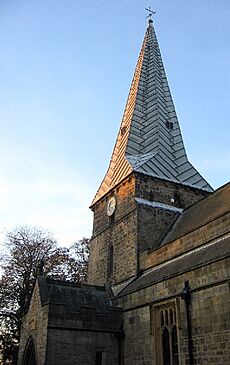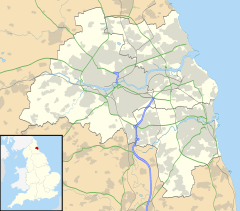Ryton, Tyne and Wear facts for kids
Quick facts for kids Ryton |
|
|---|---|
| Village | |
 The village green |
|
| Population | 7,310 (2011) |
| OS grid reference | NZ1464 |
| Metropolitan borough |
|
| Metropolitan county | |
| Region | |
| Country | England |
| Sovereign state | United Kingdom |
| Post town | RYTON |
| Postcode district | NE40 |
| Dialling code | 0191 |
| Police | Northumbria |
| Fire | Tyne and Wear |
| Ambulance | North East |
| EU Parliament | North East England |
| UK Parliament |
|
Ryton is a lovely village located in Tyne and Wear, England. It's part of the Metropolitan Borough of Gateshead. Long ago, it was part of County Durham. In 2011, about 8,146 people lived in the Ryton, Crookhill, and Stella area. The village is about 10 kilometers (6 miles) west of Newcastle upon Tyne.
Contents
Where is Ryton Located?
Ryton sits between the villages of Crawcrook and Blaydon. Both of these are also in the Metropolitan Borough of Gateshead. Other nearby places include Stargate, Clara Vale, Greenside, Stella, and Hedgefield.
Stargate is just outside Ryton, close to Blaydon. It has a fun children's park, a fish and chip shop, and a quarry. In the nearby area of Crookhill, you'll find a primary school and a general store. This store also works as a post office. Ryton is located within Gateshead's Green Belt. This means it's an area of open land kept free from building.
Ryton's Past: A Look at History

For a long time, Ryton's main jobs were farming and coal mining. Some people believe coal was mined here even in Roman times! However, it really took off in 1239. That's when King Henry III said coal could be mined outside the town walls. Records show coal was sent from Winlaton to London as early as 1367. Ryton's farms grew many different crops and raised animals too.
Because Ryton was south of the Scottish Borders and Hadrian's Wall, it was often attacked by Scottish armies. It's said that William Wallace burned the village in 1297. Another attack happened in 1346 by David II of Scotland. During this attack, the church was robbed.
Besides coal, Ryton also had furnaces for melting lead. These were part of the Ryton Company. Their mines were far away in Alston Moor. By 1704, this company joined with the London Lead Company.
The Stargate Pit Disaster
In 1800, the Stargate Pit, also known as Towneley Main Colliery, opened. A terrible accident happened there on May 30, 1826. An explosion of coal dust and gas killed 20 men and 18 boys. This sad event is known as the "Stargate Pit Disaster." There's a memorial stone at Ryton's Holy Cross Church. Another stone marks the pit itself. The Stargate Pit reopened in 1840 and finally closed in 1961.
Ryton's Growth and Change
After the Industrial Revolution, wealthy people started moving to Ryton. They wanted to escape the busy cities of Gateshead and Newcastle-Upon-Tyne. You can still see reminders of this time in the large mansions in Old Ryton Village. This area feels very rural because it's close to Ryton Willows, by the River Tyne.
One famous mansion is The Grove. It's a large brick building built around 1742. It was later made even bigger in 1919. This house was once the center of a huge 350-acre estate. This estate included many houses in Ryton Village. It also covered much of Ryton Willows down to the River Tyne. A big lake on the estate was later split into two by a railway. In 1964, a large part of the estate became a nature reserve. The Grove itself remained a private home with 7 acres of land.
After the coal industry slowed down in the late 1900s, Ryton became more like a suburb. Today, it's pretty much a part of Gateshead.
Ryton's Natural Beauty
The nearby village of Crawcrook also has a history of coal mining. You can still find traces of old mines like Emma, Clara, and Addison around Ryton and Crawcrook. Just a short walk from the main streets of both villages, you'll find beautiful countryside.
Ryton Willows Nature Reserve
One of the most impressive natural spots is Ryton Willows Local Nature Reserve. It's located by the River Tyne, near Old Ryton Village. This reserve covers 43 hectares (about 106 acres). It has grassland, ponds, and woodlands. You can find rare plants and animals here. Because of its special nature, it's called a site of special scientific interest.
Other lovely countryside areas include Stargate pond and Addison and Hedgefield Woods. Did you know that Alexander Graham Bell made one of his first telephone calls from Addison woods?
Further up the Tyne Valley, past Crawcrook and into Northumberland, you'll find rural market towns. These include Prudhoe, Corbridge, and Hexham.
Ryton Today: Life in the Village
Ryton is mostly a place where people live. It has many useful local shops and services. In the center of Ryton, you'll find a Cooperative supermarket and a Sainsbury's Local store. There are also many small, independent shops and businesses. You can find a dentist and several hair and beauty salons. The village also has a community library.
North East Falconry is based in Ryton. They have over 45 birds of prey! Ryton also has several restaurants and public houses (pubs). Two of these, Ye Olde Cross and the Half Moon Inn, are in Ryton Old Village. Ye Olde Cross is special because it's owned by the community.
Ryton has a "Mens Shed" that opens two days a week. It's a place where local men meet to learn and share their skills.
The village has a large Edwardian park. This park includes fun play equipment for children and a bowling green.
Away from the town center, there are two golf courses. These are Tyneside Golf Club and Ryton Golf Club. Both are in quiet areas near the River Tyne.
Schools and Sports in Ryton
Ryton is home to three schools, all on the same site. These are Ryton Infants School, Ryton Junior School, and Thorp Academy. Nearby Crawcrook has two more primary schools. Crookhill Primary is also close by.
Sports are a big part of the community here. Besides the golf courses and the park, Ryton has a football club, Ryton & Crawcrook Albion F.C.. They play at Kingsley Park in Crawcrook. There's also a rugby union team, Ryton Rugby Football Club, at Barmoor. And a cricket club is located across from Charles Thorp.
Ryton has good public transport with regular bus services. For example, the R3/R4 bus goes to Winlaton, Blaydon, and Rowlands Gill. Other services go to Crawcrook, Prudhoe, and Hexham in the west. To the east, you can catch buses to the MetroCentre, Gateshead, and Newcastle.
Other Interesting Features of Ryton
The famous brothers John Wesley and Charles Wesley both preached on Ryton's village green. This green has a rich history. It was important for both religious and social events. Like many village greens, it used to host an annual fair. This fair had jugglers, dancers, and local stalls.
The old pinfold in Ryton dates back to the 1100s. A pinfold was a place where stray animals were kept. It was fixed up in the second half of the 1900s.
Charles Thorp started a savings bank in 1815. It was in a building called the White House in the old village, which is still there today. People think it was the first bank of its kind in England!
Festivals and Traditions
The annual Ryton Music Festival has been held in the village for over 79 years. It takes place in February and March. It offers different types of music and drama, including choir singing and mime.
The Ryton Summer Festival is usually held at the local high school. It often features live music, sports, and arts and crafts stalls.
Every year, on the Tuesday before Christmas Eve, villagers gather on the village green. They sing traditional carols, joined by a local brass band.
World War II Reminders
In Ryton Willows, you can find two old air raid shelters. There are also other signs from the Second World War. These include trenches and shower/toilet rooms with tiles still visible. They are next to a railway line that was supposedly used to bring children from London. A hidden dirt road leading up to the village might have been a checkpoint.
Famous People from Ryton
- George Hepplewhite, a well-known furniture designer.
- Howard Kendall, a famous footballer.
- Mark Outterside, a professional football player for Sunderland AFC. He played in over 39 games in the English Football League.
- Charles Algernon Parsons, an engineer who invented the steam turbine.
- Stan Ramsay, a footballer.
- Thomas Secker, who became Archbishop of Canterbury from 1758 to 1768. He was once the Rector of Holy Cross Church, Ryton.
- Charles Thorp, who founded Durham University.
- Robert Thorp, a clergyman.
- Rachel and Becky Unthank, folk singers who grew up in Ryton.
- Nicholas Wood, a civil and mining engineer.
 | Bessie Coleman |
 | Spann Watson |
 | Jill E. Brown |
 | Sherman W. White |


